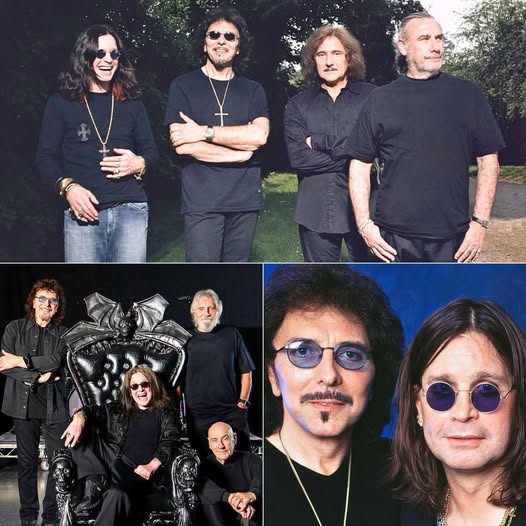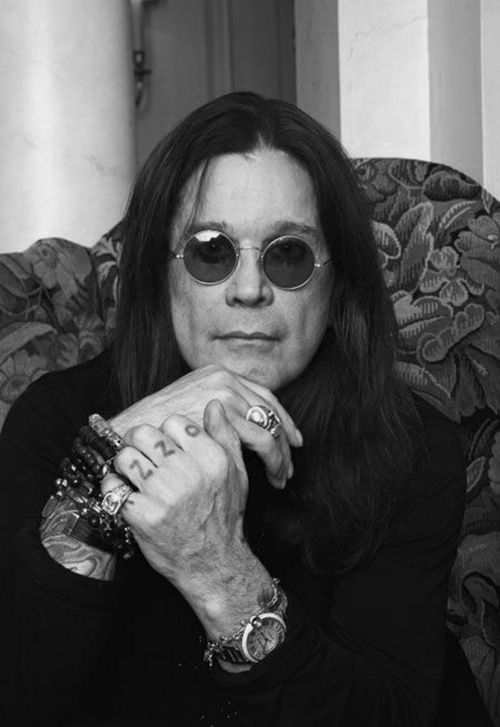“Black Sabbath wasn’t made for fame — we rose from the streets.” – Ozzy Osbourne 🤘
When Ozzy Osbourne speaks about Black Sabbath, it is never with the detachment of a rock star reflecting on a bygone era. Instead, his words still carry the raw weight of a man who lived through it, who bled through it, and who remains tethered to the roots of a band that altered the course of music forever. In a recent video, the Prince of Darkness opened up about the essence of Sabbath, the bond of its founding members, and why their music endures like no other.
This isn’t just about riffs, lyrics, or record sales. It’s about four working-class lads from Birmingham who unknowingly birthed a sound and a movement that would define generations. And according to Ozzy, it’s about something deeper: authenticity.
Rising from the Streets of Birmingham
To understand Black Sabbath, you need to understand where they came from. Birmingham in the late 1960s was not a glamorous place to start a career in music. It was a city of steel and smoke, factories and furnaces. The air was thick with industry, and life was tough.
Ozzy Osbourne, Tony Iommi, Geezer Butler, and Bill Ward were not polished musicians groomed for stardom. They were kids of the working class, hardened by an environment that gave them grit and resilience. Their art wasn’t shaped in studios with producers; it was forged in the fire of their environment.
When Ozzy says, “Black Sabbath wasn’t made for fame — we rose from the streets,” he’s underlining a truth often forgotten in today’s manufactured music industry. Sabbath didn’t emerge because they chased the spotlight. They emerged because their music was a direct reflection of their lives — heavy, dark, unrelenting.
The Bond of Brothers
Black Sabbath was not just four musicians thrown together. It was, as Ozzy explains, an “unshakable bond.”
Tony Iommi’s riffs, born from both genius and tragedy (after losing the tips of his fingers in a factory accident), gave Sabbath its signature heaviness. Geezer Butler’s lyrical depth added themes of mysticism, politics, and social commentary. Bill Ward’s drumming provided the heartbeat, unpredictable yet primal. And Ozzy’s voice, both haunting and defiant, completed the alchemy.
Their connection was not about perfection. It was about unity. Each member brought something irreplaceable to the table, and it fused into a chemistry that could not be replicated.
Ozzy often credits Iommi as the anchor of the band. In his recent reflections, he reinforced this idea: no matter how many skilled guitarists exist in the world, no one can capture the same feel as Tony Iommi. It wasn’t about technicality. It was about soul, struggle, and identity.
Tony Iommi: The Irreplaceable Sound
Plenty of guitarists can shred. Plenty can play Sabbath songs note for note. But as Ozzy points out, none can truly sound like Tony Iommi.
Iommi’s story is as legendary as the music itself. After his accident, most would have quit the instrument altogether. Instead, he adapted, creating prosthetic fingertips and experimenting with down-tuned guitars. That necessity birthed innovation — and innovation birthed a genre.
Heavy metal owes its DNA to Iommi’s riffs. But beyond the technical genius lies the intangible: the emotional weight of every chord. To this day, those riffs remain unmatched not because others cannot play them, but because they cannot embody the same spirit.
Ozzy’s admiration for Iommi isn’t just professional; it’s deeply personal. “There’s only one Tony,” he insists. And in that truth lies the unshakable identity of Black Sabbath.
Timelessness in Darkness
Fifty years later, Black Sabbath’s music still resonates. From “Paranoid” to “Iron Man” to “War Pigs,” the songs carry relevance that outlives trends.
Why? Because they speak to universal truths.
War, greed, paranoia, existential dread — Sabbath’s themes were not tied to one era. They reflected the human condition, and they still do today. The heaviness wasn’t just musical; it was philosophical. It forced listeners to confront uncomfortable realities.

Ozzy frames it perfectly: the timelessness of Sabbath lies not in its pursuit of commercial success but in its authenticity. The band wasn’t trying to write hits; they were expressing their world as they saw it. And that honesty is why their music will never fade.
Fame Was Never the Goal
“Black Sabbath wasn’t made for fame.” This line strikes at the heart of their legacy.
Unlike many bands of their era, Sabbath didn’t chase trends or polish their sound for mass appeal. If anything, their raw, dark style was at odds with the flower-power optimism of the late ’60s. While others were singing about love and sunshine, Sabbath brought doom, reality, and grit.
They weren’t designed for radio. They weren’t marketed as teen idols. And yet, their music found its way into the hearts of millions because it was real. In rejecting the pursuit of fame, they stumbled into immortality.
Influence Across Generations
Ozzy’s reflections also highlight just how wide Sabbath’s shadow extends. Nearly every heavy band that followed — from Metallica to Slayer to Pantera — owes a debt to Sabbath. Even outside of metal, their influence can be felt in genres that borrow from their raw energy and atmosphere.
Generations of musicians have covered Sabbath, but as Ozzy says, they cannot recreate the original magic. That isn’t a dismissal of their talent; it’s a reminder that Black Sabbath wasn’t just music. It was an experience born from a very specific time, place, and brotherhood.
The End That Wasn’t the End
Black Sabbath officially retired in 2017 with their “The End” tour, closing the circle in their hometown of Birmingham. Yet even in retirement, their spirit hasn’t dimmed. Their music is still performed, studied, and celebrated around the world.
And Ozzy himself, despite health challenges, continues to embody the rebellious spirit that made Sabbath what it was. His voice, his presence, and his stories keep the flame alive for both old fans and new generations discovering the band for the first time.
Lessons from the Streets
So what can we learn from Sabbath’s journey, as reflected in Ozzy’s words?
- Authenticity Triumphs Over Trends
They didn’t conform. They created, and in doing so, they outlasted their contemporaries. - Struggle Fuels Innovation
Tony Iommi turned tragedy into triumph. His accident didn’t end his story; it began a new one. - Unity Creates Magic
The bond between the four original members was more important than fame or fortune. That unity forged something unbreakable. - Timeless Art Speaks Truth
Sabbath’s music remains relevant because it was honest, raw, and fearless.
Why Sabbath Still Matters Today
In a world where music is often algorithm-driven, focus-group tested, and packaged for mass consumption, Black Sabbath’s story is more vital than ever. They remind us that great art doesn’t come from chasing fame. It comes from expressing truth, no matter how dark or unpolished.
Ozzy’s reflections are a wake-up call for musicians and fans alike. The true spirit of music is not found in imitation or technical perfection, but in authenticity and soul.
Conclusion: The Eternal Sabbath
When Ozzy Osbourne says, “Black Sabbath wasn’t made for fame — we rose from the streets,” he’s not just reminiscing. He’s teaching us something about art, about life, and about the power of staying true to one’s roots.
Black Sabbath may have begun as four kids from Birmingham, but what they created transcends time and place. They were not designed for fame, but they achieved something far greater: eternity.
And as long as riffs thunder and voices cry out in rebellion, the spirit of Black Sabbath — raw, authentic, and unshakable — will live on.


